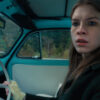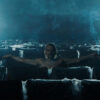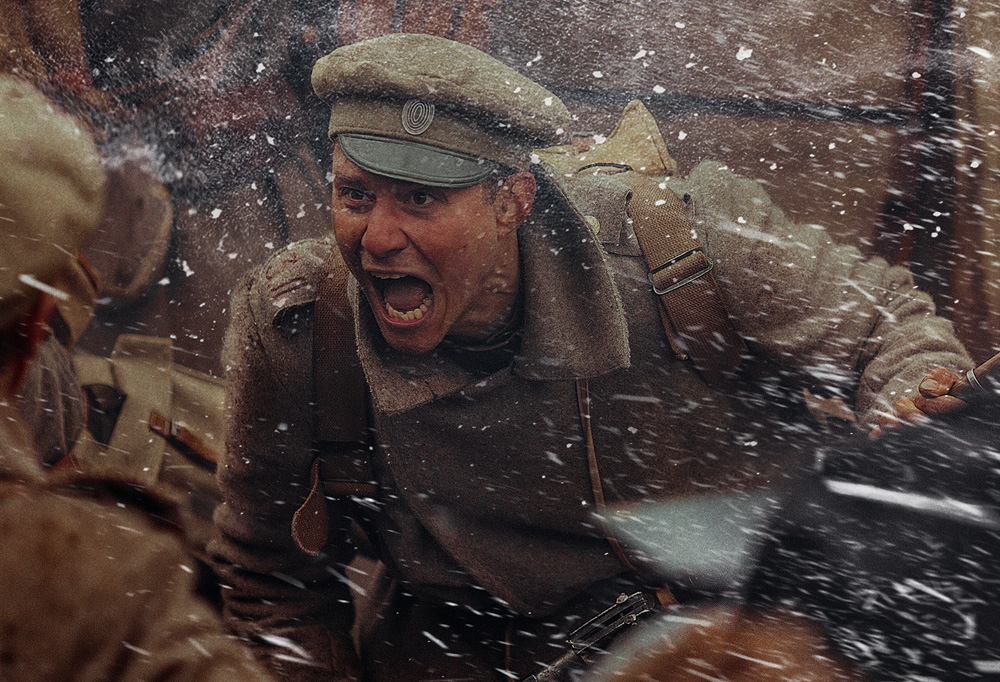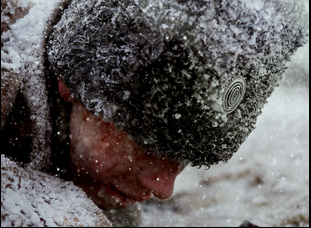For the better half of the 20th century, “Blizzard of Souls,” Aleksandrs Grīns’ memoir of his time in the army as a rifleman during World War I had been nearly impossible to read since its publication in 1934, as was most of his writing by the Soviet Union when it dealt with their occupation of his native Latvia. So there had been pent-up demand when its film adaptation opened last year, becoming a sensation at home that would easily outperform previous box office record holders such as “Avatar” and “Titanic,” perhaps taking their place but also fitting snugly alongside them when director Dzintars Dreibergs mounted a historical epic on a scale that had never been seen before from a local production. Staged over the course of a year in order to capture every season, the film goes into epic detail to convey the experience of Arturs (Oto Brantevics), a teenager in Jelgava who must ask for his father’s permission to join the battalion after the town is evacuated and his past is all but wiped away with the arrival of German forces and then comes to wish he hadn’t signed up for a war in which he sees fresh horrors on a daily basis as the Soviet Army, for whom the Latvians fight for at first, impose their own will to the point that local battalions start to form to fight for their independence.
Still, to reflect a period in which the Latvian population was cut down by half, Dreibergs tells a story of endurance that is a point of national pride, enabling the involvement of hundreds of extras for battle scenes on a limited budget and with cinematographer Valdis Celmins and composer Lolita Ritmanis, give a monumental sweep to this history that is little known to the world at large. Resting on the shoulders of first-time actor Brantevics, “Blizzard of Souls” conveys the weight that’s gradually placed upon him as he’s confronted with taking lives to ensure his own survival and that of his platoon and watching those he gets to know die in front of him without warning. It’s a harrowing drama, but ultimately a rewarding one when it extends such an immersive experience to the audience, showing the sacrifice of those who feel duty-bound to serve in the name of countless others. With the film now competing for a Best International Feature prize at this year’s Oscars and recently made available to watch on demand, Dreibergs, Brantevics, Celmins and Ritmanis reunited to talk about embarking on such a huge undertaking, creating a style that would place audiences right in the thick of combat and bringing this story to the world.
Dzintars Dreibergs: To tell you the truth, I always wanted to make movies like this if I feel there is the possibility to tell something that’s not told before. In this case, it’s this very personal story of the young boy whose home becomes a battleground, and it was written by the real rifleman who was entrenched while he was writing it, so to take it and put in the cinema, especially knowing that his life was obstructed by the next war, the occupation of Latvia, and he never got the possibility [at a real life] and when in Latvia, this book was forbidden for 50 years, if I had the chance to tell such a story, there’s no doubt that’s the reason I’m making films.
Oto, how did you get involved?
Oto Brantevics: It happened unexpectedly because I went to the casting with my friends just for fun. I didn’t want to play a role in this movie. However, I was interested in acting when I was a child, and when this casting happened, I was already a teenager, but I didn’t know what I was doing, to be honest. I was just doing what came to my mind. I was thinking, “Okay, instantly, I need to do this and I will do this, and that’s it.” So I did not try to become an actor and I did not try to get the main role. It just happened. It was fate or something like that.
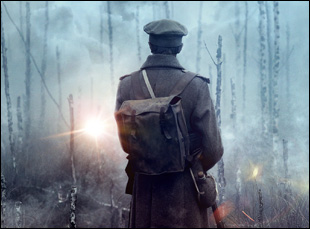
Oto Brantevics: I used many things. At first, I watched many, many war movies, both from Western Europe and USA, to understand the thinking and life of a simple soldier. I also read the novel, “Dveselu Putenis,” and other Latvian classics. I also discovered a Latvian band called Skyforger. They have the album called “Latvian Rifleman,” which played a very big part in motivating me while I was filming. While I listened to this music, I get this strange feeling that I need to continue, and I have the real rifleman behind me to do these things. All this mixed together to help me understand Arturs more.
The camerawork really stays attached to Arturs’ perspective throughout. What was it like figuring out the cinematic language of this?
Valdis Celmins: To tell this story of a coming of age story of a young kid, you have to concentrate on him, so we wanted to really avoid the cliches of war movies [where] you have huge establishing [shots] of 100 million people running from one side and then clashing the other side. We understood that we couldn’t afford it, but it also wasn’t what we wanted to tell with the movie. At the same time, I was very impressed by a theory of Christian Berger, [a frequent cinematographer for Michael Haneke]. He has this concept that you can avoid wide establishing shots if you are using wide lens for the medium shots and for the closeups, so if you will have a moving camera, it means the audience slowly, shot by a shot, starts to understand where the situation is set and what’s going on in the background. You don’t need a separate shot just to show where it is.
Of course, it changes the emotions and rhythm of a movie dramatically, so this was one of the things that pushed us to the direction of making our own language. Another inspiration was László Nemes’” Son of Saul.” If you remember, this beautiful, very conceptual movie, the camera always stays behind the main character and with a very narrow, quite long lens, so you don’t see much of the surroundings, but what you see is exactly enough to understand what’s going on. We didn’t want to make it so experimental, but we wanted to keep it so that audience doesn’t really feel the concept of a movie. but it just gives the feeling and doesn’t show itself. The best compliment is that general audiences haven’t noticed anything about the camera being close to the character all the time with him, showing only what he sees.
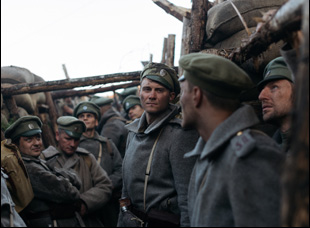
Dzintars Dreibergs: Yeah, that was important for two aspects. When Oto started, he was just 15 years old, and as an actor, he had a huge challenge because his range had to be huge — [the character] started as a naive boy, and then he had to be the guy who can actually lead somebody and during this time, Oto was maturing as a person in real life, so it was [constructed] very much for the actor also to mature during the film visually. But secondly, if we have to take a five-year period of time, it’s better to see winter change to summer to autumn leaves, the environment always changing rather than just [a title card saying], “After half a year.” Also, we are blessed to live in a country where seasons change so much that it is great to use this visual richness for different aspects.
Is it true you went back to some of the real battlefields where this took place?
Dzintars Dreibergs: That was actually crucial. In the beginning, we started [thinking we could shoot the] locations as if they’re real ones, but when we were there, of course, so many things changed after 100 years — there are 100-year-old trees, which are quite big now. But several battle scenes that you see in the movie [are at the] real [places] where the same guys were fighting. Those young guys next to the bridge were next to the same bridge. This moment where they’re freezing, this is the same swamp. There’s several such places, and especially in these moments when it became very hard, because it was like minus 17, 18 degrees Celsius during the shooting, we started to realize that we are starting to complain about being cold although we are dressed up amazingly well, we’ve got hot tea and we can have pauses when we want, but those guys were lying there for three days in exactly the same place, with shitty clothes, and they couldn’t have fire because there are bullets flying around and if they make the fire, the enemy sees them.
For many of us, this was one of those first moments when we realized that it’s almost impossible even to imagine how it was in the war. And it made a huge duty for us, for the film actually to tell the story as truthfully as possible, so like the end of the movie, we can actually celebrate that we currently live in a democracy [where] we can actually do whatever we want. We can talk and now say whatever we want, but those generations who were in the war, we lost them. Even those who survived, they most likely had very crippled lives after that, so let’s understand that we never will understand them fully, but let’s appreciate where we are now. This location filming was huge factor to realize that.
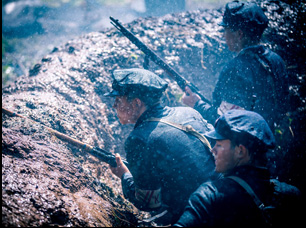
Lolita Ritmanis: Latvia is a gem. It’s a beautiful, beautiful country, with beautiful people and song is very much a part of our culture. My parents had read the novel when they were young, and I remember when I got the screen play, I was very excited, but I was wondering, “How well is it going to translate? Can you take this epic novel and condense it?” And when [my parents] gave it the stamp of approval, that was my final, “I’m absolutely doing this. This is great.” It was a full circle moment to be able to work on something that is from my heritage and to be able to help in some way bring this story to an international audience also. So many of my colleagues and friends are just like, “What are you working on? Oh, it’s one of your Latvian things,” thinking it’s some small little thing,” but it’s my most epic endeavor and when they heard the score, and many have seen the film, and they’re just, “Oh my God, this is just an incredible story. And the score is epic and the cinematography is incredible.” So to be a part of this and to be able to use my voice has been an incredible gift to me. And bravo to the musicians and to the State Choir of Latvia.
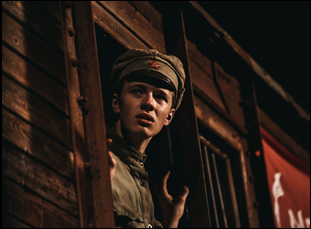
Dzintars Dreibergs: We are actually blessed by that, because the budget of the movie is less than $2 million and we realized that it’s almost impossible to do it. So we had to ask on Facebook, “People, please come join us as volunteers, because we cannot pay for this.” It became more like an adventure. At the same time, it was paying respect to those guys who were there. When it become harder for us to shoot, these volunteers who were ready to come and shoot gave a lot of strength and also the many people Lolita worked with. The last song which you start to hear when the titles appear is a prayer from the book [about] what’s happening there and the tragic situation of this state war, fighting against dictatorship there. If this goes [across] the borders and it really helps this idea of freedom [around the world], it means a lot. It meant a lot with the volunteers there. It means a lot with the music, and I really, really hope that this film will have a chance to be noticed from the hundreds [competing for] the Oscar, because we want to remind [audiences around the world] about war, about violence, and how stupid it is to have something like that in 21st century.
“Blizzard of Souls” is now available in virtual cinemas. A full list is here.
